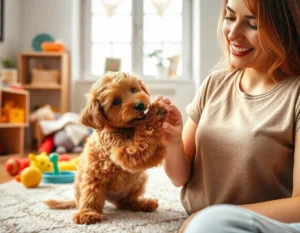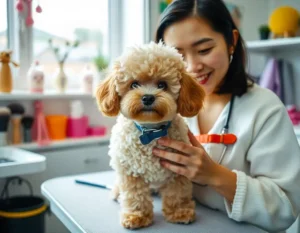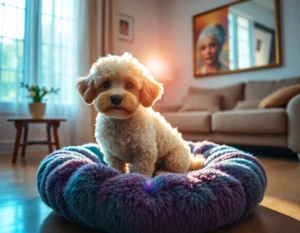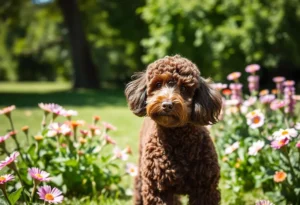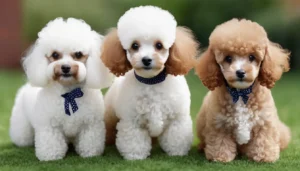A Baby Poodle is a small, cute dog that makes an excellent companion pet for families of all sizes. This intelligent and trainable breed is known for its curly coat and hypoallergenic qualities, making it a popular choice for those who are looking for a lovable and low-shedding dog. As a poodle puppy grows, it can become an active and playful member of your home, and the bond you build with them through proper training and care will last a lifetime.
Training your Baby Poodle begins with understanding its temperament and needs. Poodles are eager to please, which makes poodle training enjoyable and rewarding. Using positive reinforcement during obedience training helps your puppy learn quickly while keeping them happy and motivated. Along with regular exercise, proper puppy care includes consistent socialization, which ensures that your Baby Poodle grows up to be a well-behaved and confident dog. When it comes to poodle grooming, regular brushing and maintaining their curly coat is crucial for their health and comfort. Keeping up with poodle grooming ensures your Baby Poodle looks and feels great while minimizing shedding. Furthermore, poodle health should always be a priority, so be sure to monitor your dog’s well-being and provide regular checkups. Whether it’s a Toy Poodle or a Miniature Poodle, these small dogs thrive on attention, affection, and a consistent routine. By focusing on training, exercise, and proper care, you will not only raise a well-behaved puppy but also build a lifelong bond with your adorable Baby Poodle.
Table of Contents
Baby Toy Poodle | What to Expect
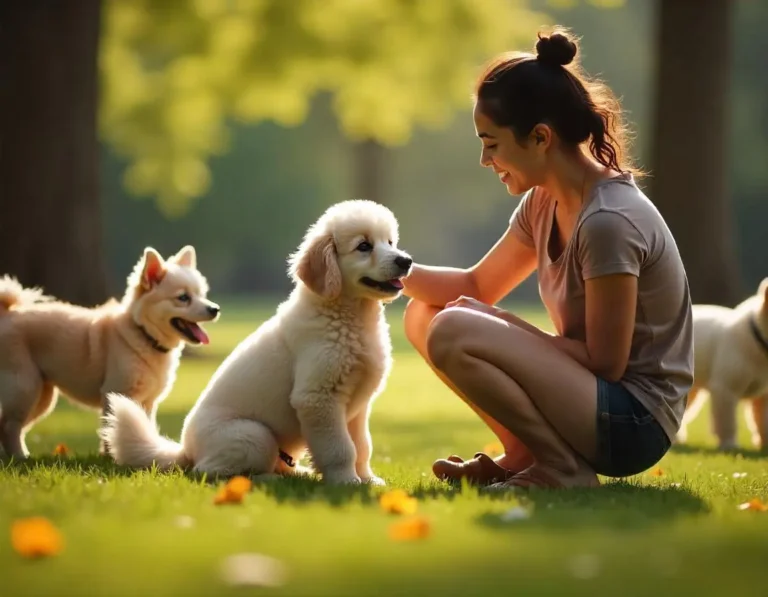
A Baby Toy Poodle is a small dog that can make a big impact on your family. These adorable pups are known for their hypoallergenic coat, making them a great option for families who want a cute dog without the worry of shedding. The Toy Poodle is one of the smallest poodle breeds, typically weighing between 4 to 6 pounds and standing up to 10 inches tall. Despite their small size, these dogs are highly intelligent, playful, and trainable, which makes them great companion dogs for families, singles, and even seniors.
Personality Traits of the Baby Toy Poodle
The Baby Toy Poodle is an affectionate and energetic breed, with a temperament that is eager to please. They are known for being social and loving towards family members, making them ideal family pets. Due to their intelligence, Toy Poodles tend to learn quickly and enjoy training, especially when positive reinforcement is used. This makes them easy to train, and they thrive when given mental stimulation and regular exercise. However, their playful nature also means they can be mischievous if not properly guided.
Behavior and Training of a Toy Poodle
Unlike other poodle sizes, Baby Toy Poodles are known for their smaller size but energetic behavior. They may not be as physically demanding as larger poodles, but they still require daily exercise and mental challenges to keep them happy and healthy. Their trainability is one of their most charming qualities; they can easily learn basic obedience commands, and their eagerness to please makes training sessions enjoyable for both the dog and owner. Consistent training helps them develop good behavior and enhances their bond with their owner.
Grooming and Care for Baby Toy Poodles
As a hypoallergenic dog, the Baby Toy Poodle requires regular grooming to maintain its beautiful curly coat. Their hair grows continuously and doesn’t shed like most dogs, so daily brushing is necessary to prevent mats and tangles. Regular professional grooming every 4 to 6 weeks will also help keep your Toy Poodle looking its best. Additionally, Toy Poodles should be bathed periodically to keep their skin and coat healthy. The coat itself, although low-shedding, needs attention to maintain its soft texture.
Health Considerations for Your Baby Toy Poodle
In terms of health, Toy Poodles are generally a healthy breed but, like all dogs, they can be prone to certain issues. Regular vet check-ups are essential to ensure your puppy is growing strong. Toy Poodles may experience joint problems such as patellar luxation or dental issues, so it’s important to pay attention to their health and maintain a proper diet to prevent such conditions. Feeding them the right diet, with a good balance of nutrients, will ensure they stay energetic and maintain their health. Additionally, early socialization is essential to help your Toy Poodle develop a well-adjusted and balanced temperament.
Exercise and Diet for Your Baby Toy Poodle
Even though Toy Poodles are small dogs, they still need regular exercise to keep their minds and bodies fit. Short walks, playtime, and some training activities will suffice. Exercise also helps to prevent behavior issues that may arise from boredom. In terms of diet, it’s crucial to provide them with high-quality dog food that meets their specific needs. Baby Toy Poodles require a balanced diet to fuel their playful nature and support their growing bodies. Make sure to follow feeding guidelines and avoid overfeeding, as obesity can lead to health problems in small breeds.
Final Thoughts on Raising a Baby Toy Poodle
Overall, a Baby Toy Poodle makes a great addition to any household. With proper training, grooming, and care, these intelligent, playful, and affectionate pups will grow into wonderful family pets. They are easy to train, love to be around family members, and will fill your home with joy. By meeting their needs for exercise, diet, and socialization, you can ensure a long, happy life for your new furry friend.
Baby Mini Poodle | A Miniature Bundle of Joy
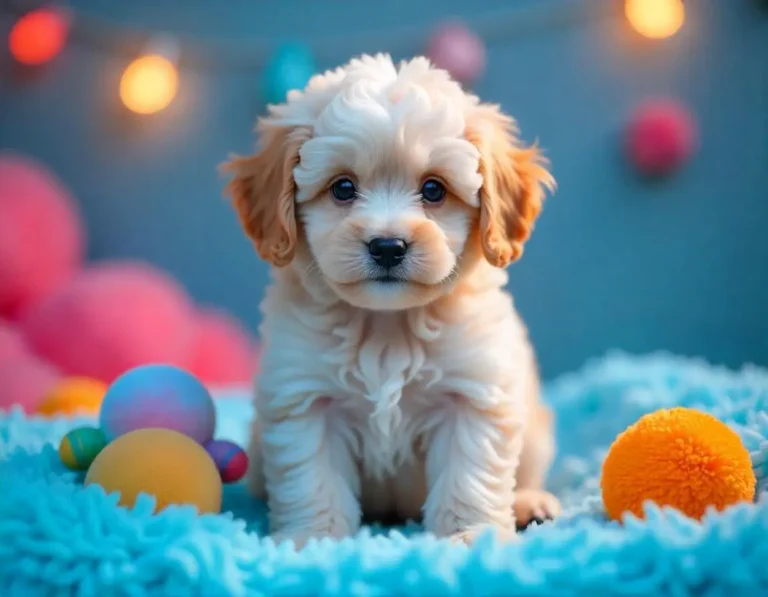
The Baby Mini Poodle is a small breed that packs a lot of personality into a little body. These dogs are loved for their adorable appearance, hypoallergenic coat, and high energy. They are highly intelligent pets that make excellent companion animals for families, singles, and seniors alike. The Miniature Poodle is slightly larger than the Toy Poodle, but still falls into the category of small dogs, making them easy to care for and a good fit for various living situations, from apartments to houses.
Characteristics of Miniature Poodles
Miniature Poodles are a small breed, typically standing between 10 to 15 inches tall and weighing around 15-20 pounds. Their curly coat is one of their standout features, giving them a charming and elegant look. As a hypoallergenic breed, Miniature Poodles shed very little, making them ideal for families with allergies. Their coat requires regular grooming to keep it in top condition, and daily brushing helps to prevent matting. These intelligent dogs are active and need daily exercise to stay happy and healthy. Their playful temperament makes them fun companions who enjoy being around their family members.
Miniature Poodles vs Toy Poodles | Key Differences in Care and Temperament
While both the Miniature Poodle and the Toy Poodle share similar characteristics, such as their hypoallergenic coats and intelligence, there are some key differences in care and temperament. Miniature Poodles tend to be more active and energetic compared to Toy Poodles. This means they may need slightly more exercise and mental stimulation. In terms of care, Miniature Poodles are a bit larger and may require more space to move around than their Toy counterparts. Both breeds are highly trainable, but Miniature Poodles may need a bit more exercise to help manage their high energy.
When it comes to temperament, Miniature Poodles are known for their playful and affectionate nature. They thrive in family-friendly environments and are excellent companion animals. They get along well with other pets and children, especially if they are socialized early. Both Miniature and Toy Poodles are intelligent and eager to please, which makes training relatively easy. With patience and consistency, they can learn a variety of commands and tricks, making them a joy to train and live with.
Training and Socialization for Your Baby Mini Poodle
Training your Baby Mini Poodle is essential to ensure they grow up to be well-behaved and happy. These intelligent dogs pick up new skills quickly, especially when positive reinforcement is used. Start early with basic puppy training and socialization techniques. Expose your Miniature Poodle to different environments, people, and other dogs to help them become well-rounded and confident pets. Puppy socialization is crucial at a young age, as it helps them build good behaviors and learn to interact appropriately with others.
Since Miniature Poodles are known for their high energy, it’s important to keep them mentally and physically stimulated. Regular playtime and short walks will help burn off excess energy and keep your puppy content. Incorporating interactive toys into playtime can provide mental challenges that benefit their development.
Grooming and Canine Care for Your Baby Mini Poodle
One of the important aspects of owning a Baby Mini Poodle is maintaining their coat through regular grooming. Their curly hair does not shed, but it requires frequent brushing to avoid matting. Professional grooming every 4 to 6 weeks is recommended to maintain their fluffy appearance and ensure their coat stays healthy. Along with grooming, you’ll need to care for your Miniature Poodle’s nails, teeth, and ears. Keeping up with these aspects of canine care helps ensure your puppy remains healthy and happy.
Health Considerations for Baby Mini Poodles
Miniature Poodles are generally healthy dogs, but like all breeds, they can be prone to certain health issues. It’s important to schedule regular vet check-ups to keep an eye on your puppy’s health. Common health considerations for Miniature Poodles include dental problems, joint issues, and eye conditions. Early intervention and good care can prevent many of these problems from becoming serious. Maintaining a balanced diet and regular exercise routine will help keep your Miniature Poodle in good health.
Final Thoughts on Raising a Baby Mini Poodle
Baby Mini Poodles are wonderful family pets that bring joy and energy into any household. Their playful temperament, intelligence, and hypoallergenic coat make them a great choice for families looking for a small, trainable dog. With proper training, socialization, and grooming, your Miniature Poodle will grow into a well-behaved and happy companion. As with any small breed, giving your Baby Mini Poodle the right care and attention will ensure they lead a long, healthy, and fulfilling life as a beloved family member.
Baby Poodle Black and White | A Stunning Mix of Colors
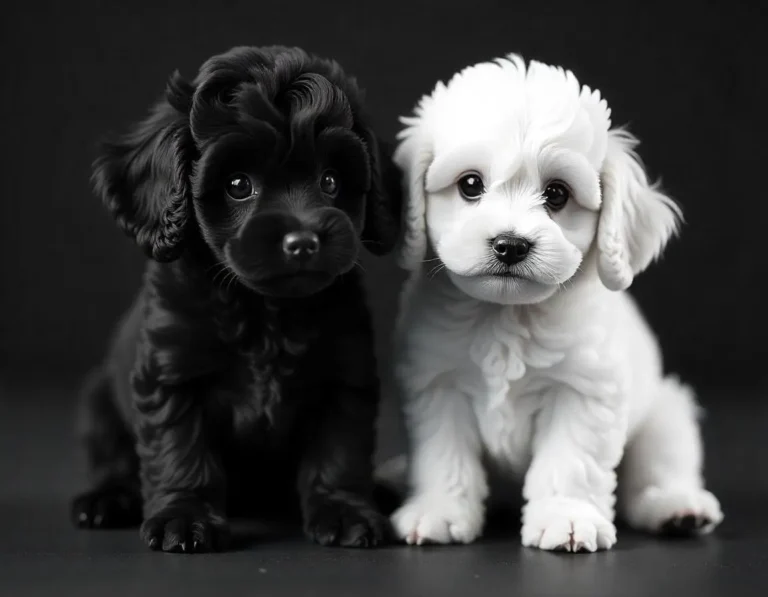
The Baby Poodle, particularly the black and white variety, is one of the most eye-catching versions of this beloved breed. The striking contrast between the black and white patches on their curly coat makes them stand out. These adorable puppies are not only known for their beauty but also for their intelligence, hypoallergenic qualities, and playful nature. A black and white Baby Poodle can make an excellent companion dog, as they are both charming and loving.
The Beauty and Uniqueness of Black and White Baby Poodles
The black and white Baby Poodle has a distinct and elegant appearance that catches everyone’s attention. Their coat, made up of black and white patches, is a signature feature of the breed. This coat coloration is one of the many variations that poodles come in, making them a versatile and sought-after dog breed. While black and white is a common combination in Poodles, each puppy may have a unique mix of these colors, giving every Baby Poodle its own individual charm.
In addition to their stunning looks, Baby Poodles are known for being hypoallergenic dogs. This makes them a great choice for families or individuals with allergies. Their coat doesn’t shed much, which means fewer allergens in the air, making them one of the best options among small dog breeds for allergy sufferers.
Grooming Tips for the Black and White Baby Poodle
Like all poodles, the black and white Baby Poodle requires regular grooming to maintain a healthy, shiny coat. Poodles have curly hair that can become matted if not properly cared for, so grooming is essential. The black and white coat, while beautiful, can sometimes show dirt more easily, so routine cleaning and brushing are key to keeping your puppy looking its best.
Start brushing your Baby Poodle regularly, ideally every other day, to prevent tangles and mats. Invest in a good quality dog brush designed for curly coats. Regular grooming will also help to distribute the natural oils in their coat, keeping it shiny and healthy. In addition to brushing, schedule professional grooming every 4 to 6 weeks to keep your puppy’s coat in top condition.
Don’t forget that grooming also includes other care aspects such as trimming their nails, cleaning their ears, and brushing their teeth. All of these contribute to maintaining their overall health and well-being.
Why Choose a Black and White Baby Poodle?
Baby Poodles are not only adored for their looks, but also for their temperament. They are known for being intelligent, playful pets that are easy to train. Whether you have a black and white Toy Poodle or a larger variety, Poodles are all eager to please, making them highly trainable dogs. Early puppy training and socialization are key to helping your Baby Poodle grow into a well-behaved, well-adjusted adult dog.
Their hypoallergenic nature also makes them a good option for families with allergies, as they shed very little. With proper puppy care, your Baby Poodle will thrive, and you will enjoy their loving companionship for many years.
Final Thoughts on Baby Poodles Black and White
Baby Poodles in black and white are a stunning mix of colors and a wonderful addition to any family. Their playful and intelligent nature makes them ideal companions for people of all ages. Regular grooming is essential to maintain the health of their coat, while also ensuring they stay comfortable and looking great. Whether you choose a black and white Toy Poodle or another type of Poodle, you’re sure to enjoy the loyalty, affection, and joy they bring to your home.
By understanding their grooming needs, training requirements, and unique features, you can provide the best care for your black and white Baby Poodle and ensure they grow into a happy, healthy, and well-loved family member.
Baby Poodle Black | All About the Gorgeous Black Coat
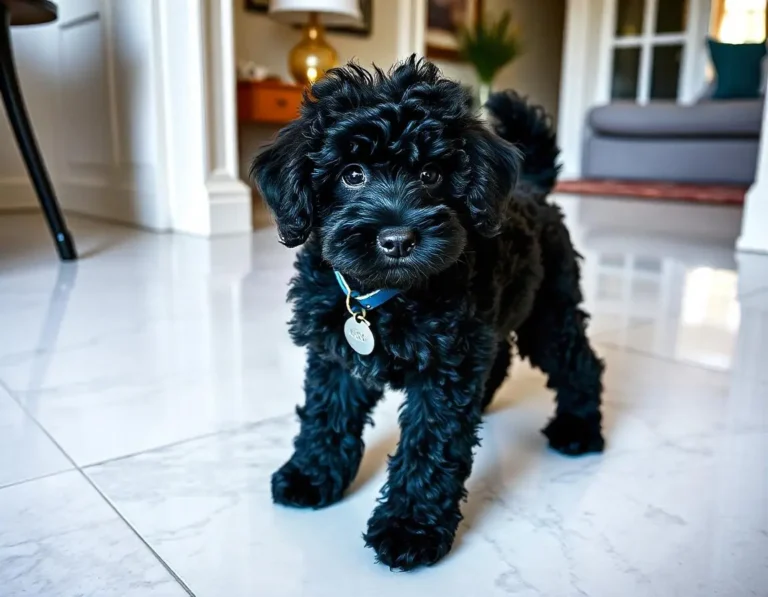
The Baby Poodle Black is a striking and elegant variation of the Poodle breed. Known for their beautiful shiny black coat, these small dogs are not only visually stunning but also come with an array of wonderful qualities. Whether you’re considering adoption or already have a black Baby Poodle, this breed is sure to bring joy to your home with its loving nature and playful temperament.
Special Characteristics of a Black Baby Poodle
Black Baby Poodles are part of the toy poodle group, and they share the same delightful characteristics as other poodle breeds. Their black coats are dense, curly, and hypoallergenic, which makes them ideal for families or individuals with allergies. The black poodle is a non-shedding dog, so they won’t leave hair all over your home, making them easy to keep clean. These intelligent dogs are known for being easy to train and are well-suited to life with family members, whether you live in a small apartment or a house.
Black Baby Poodles tend to have a calm and friendly disposition, making them wonderful companions. They are highly trainable, and their temperament is often described as affectionate and playful. Due to their intelligence, they are also great candidates for obedience training, and they enjoy spending time with their family members.
Grooming and Care Considerations for Black-Coated Poodles
While the black poodle’s coat is beautiful, it does require regular grooming to maintain its health and appearance. Because they have curly coats, black Baby Poodles need consistent brushing to prevent mats and tangles. Regular grooming is a key part of puppy care for this breed. It’s essential to brush their coat several times a week to keep it looking smooth and shiny.
Additionally, since Baby Poodles are hypoallergenic dogs, they are a great option for pet owners with sensitivities to dog dander. However, grooming is still necessary to maintain the health of the coat and prevent any issues with the skin.
Proper puppy care also includes bathing, which should be done every 3-4 weeks to ensure their coat remains fresh and their skin stays healthy. Along with regular grooming, routine check-ups with a vet can help monitor the dog’s health, especially when it comes to common issues that can affect poodles, such as ear infections or dental care.
Black Baby Poodle makes a delightful and loving companion. Their striking appearance, hypoallergenic qualities, and trainable nature make them a great choice for families and individuals alike. With the right grooming routine and care, your black poodle will thrive as a healthy, happy, and well-adjusted member of your family.
Baby Poodle White | The Elegant White Baby Poodle

The Baby Poodle White is one of the most elegant and charming varieties of the Poodle breed. Known for its bright white coat, this small dog is an excellent companion for families and individuals alike. Whether you’re seeking a playful puppy or a loyal companion dog, the white Baby Poodle is sure to steal your heart with its affectionate and intelligent nature. Their hypoallergenic coat also makes them a perfect choice for those with allergies, as they shed minimally.
Stunning Traits of White Baby Poodles: Size, Coat Color, and Temperament
A White Baby Poodle is considered a toy breed, meaning it stays small and manageable in size. These adorable dogs typically weigh between 4 to 6 pounds and stand about 9 to 11 inches tall, making them perfect for small living spaces or as companions for those seeking a small dog. Their coat is their most noticeable feature – a soft, curly, and bright white coat that is both beautiful and hypoallergenic. This makes them an ideal choice for families with allergies or those seeking a non-shedding dog.
In terms of temperament, the Baby Poodle White is known for being playful, affectionate, and intelligent. These little dogs love to engage with their family members and enjoy being the center of attention. Their playful puppy nature makes them great for children, and they are highly trainable due to their intelligence. Whether you’re looking for a companion pet to keep you company or a dog that is easy to train, the White Baby Poodle is a perfect match.
Grooming Tips and Tricks for Maintaining a Shiny White Coat
To maintain the stunning white coat of your Baby Poodle, regular grooming is essential. While their hypoallergenic coat is a bonus for allergy sufferers, it also requires consistent care to keep it looking clean and shiny. Brushing their coat a few times a week is recommended to prevent matting and tangles. Since Baby Poodles have curly fur, it’s important to ensure their coat stays soft and manageable.
In addition to brushing, it’s necessary to bathe your white Baby Poodle every few weeks using a gentle dog-specific shampoo. This helps maintain the white color of their coat and keeps it free from dirt and oils that can cause discoloration. Be sure to dry them thoroughly to avoid any dampness that could lead to skin irritation or discomfort.
As with all Poodles, the Baby Poodle White will need regular trimming to keep its coat looking neat and healthy. Depending on the length of the fur and the desired look, you may want to trim their fur every couple of months. This helps preserve their signature poodle appearance and ensures they stay comfortable.
The White Baby Poodle is a gorgeous and intelligent dog breed that makes for a perfect companion pet. With its hypoallergenic coat, affectionate personality, and playful temperament, it’s no wonder why many families and individuals fall in love with these small, intelligent dogs. Regular grooming and care will keep your Baby Poodle White looking elegant and healthy for years to come, ensuring a long-lasting bond with your new furry friend.
Baby Poodle Mix | Understanding the Poodle Mixes
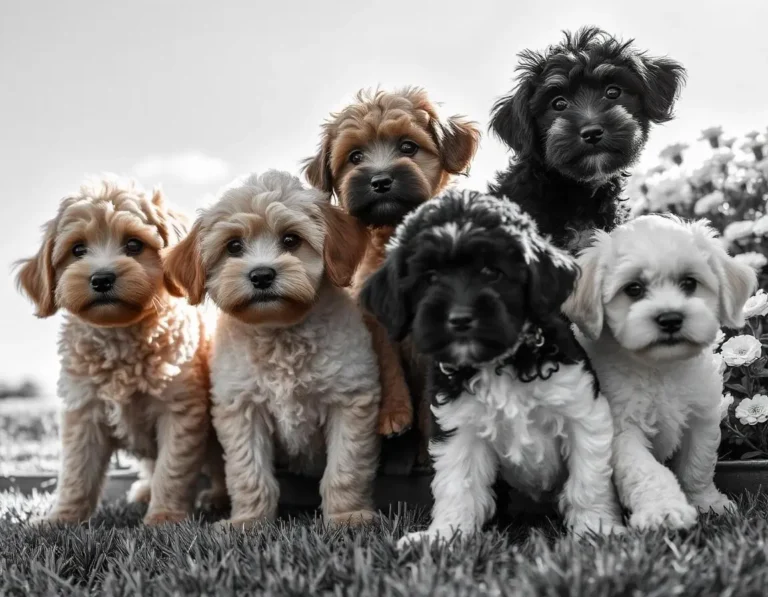
A Baby Poodle Mix refers to the offspring of a Poodle (whether Toy, Miniature, or Standard) bred with another dog breed. These mixes are becoming increasingly popular due to their combination of the Poodle’s hypoallergenic coat, intelligence, and friendly nature with the unique traits of other dog breeds. Whether you’re interested in a Cockapoo, Cavapoo, or another poodle mix, these adorable pups offer the best of both worlds.
Popular Baby Poodle Mixes | Cockapoo, Cavapoo, and More
Two of the most common Baby Poodle Mixes are the Cockapoo (a mix of a Poodle and a Cocker Spaniel) and the Cavapoo (a Poodle mixed with a Cavalier King Charles Spaniel). Both of these designer dogs inherit the Poodle’s hypoallergenic coat and intelligence, along with the lovable, affectionate traits of their non-Poodle parent. These mixes are small breed dogs, typically weighing between 10 to 20 pounds, and are known for being energetic, playful, and friendly companions.
Other popular poodle mixes include the Schnoodle (Poodle and Schnauzer) and the Maltipoo (Poodle and Maltese). The size and temperament of a Baby Poodle Mix can vary depending on the breed combination, but they tend to inherit the Poodle’s hypoallergenic qualities, which makes them a great choice for those with allergies. They are typically affectionate, energetic, and adaptable to various lifestyles.
Traits, Size, and Temperament of Poodle Mixes
The temperament of a Baby Poodle Mix depends on the other breed involved, but most poodle mixes inherit the Poodle’s intelligence and friendly nature. They are usually very trainable and love human companionship. Due to their intelligence, these dogs thrive in homes where they can receive mental stimulation and engage in puppy training and socialization. Regular training is essential to ensure good behavior and a well-balanced dog.
The size of a Baby Poodle Mix can vary significantly. Some mixes, like the Cockapoo, may be on the smaller side, while others, like the larger Schnoodle, may be more medium-sized. It’s important to research the specific mix you are interested in to understand the potential size and grooming needs. In general, most poodle mixes are small to medium-sized dogs, making them great companions for families and individuals living in apartments or smaller spaces.
Grooming and Care for a Baby Poodle Mix
One of the key characteristics of Baby Poodle Mixes is their hypoallergenic coat. However, grooming needs will vary depending on the specific mix. Poodle mixes generally require regular grooming to keep their coat in good condition and avoid matting. Regular brushing is essential, especially for those mixes that inherit the Poodle’s curly or wavy fur.
Since most Poodle mixes are small dogs, grooming usually isn’t as time-consuming as it would be for larger breeds. However, you should still stay on top of their care by ensuring regular baths, trimming, and checking their ears for cleanliness, as some poodle mixes can be prone to ear infections. In addition to grooming, be sure to provide your poodle mix with puppy care essentials such as a balanced diet, appropriate exercise, and plenty of mental stimulation.
Health Considerations and Lifestyle Compatibility
The health of a Baby Poodle Mix is generally good, as Poodles are a breed known for being fairly healthy. However, like all dog breeds, poodle mixes can inherit health issues from their non-Poodle parents. It’s important to ensure that you are adopting from a responsible breeder who screens for common health issues. Regular vet check-ups and maintaining a proper diet and exercise routine are key to ensuring your mix stays healthy.
These mixes are generally well-suited to a variety of lifestyles. If you’re looking for an energetic dog that will keep up with an active lifestyle, most poodle mixes, like the Cockapoo, will be a great fit. They’re also highly adaptable, making them ideal for families, singles, and even seniors. Their friendly nature and hypoallergenic coats make them excellent companions for people with allergies, as well as for homes with children or other pets.
A Baby Poodle Mix combines the best traits of the Poodle and another breed, making them an intelligent, hypoallergenic, and friendly companion. Whether you’re looking for a playful puppy with lots of energy or a loving companion who will curl up beside you, these mixes are sure to fit your needs. With the right training, socialization, and care, a Baby Poodle Mix will become a loyal member of your family for years to come.
Baby Poodle Newborn | Caring for a Tiny Pup
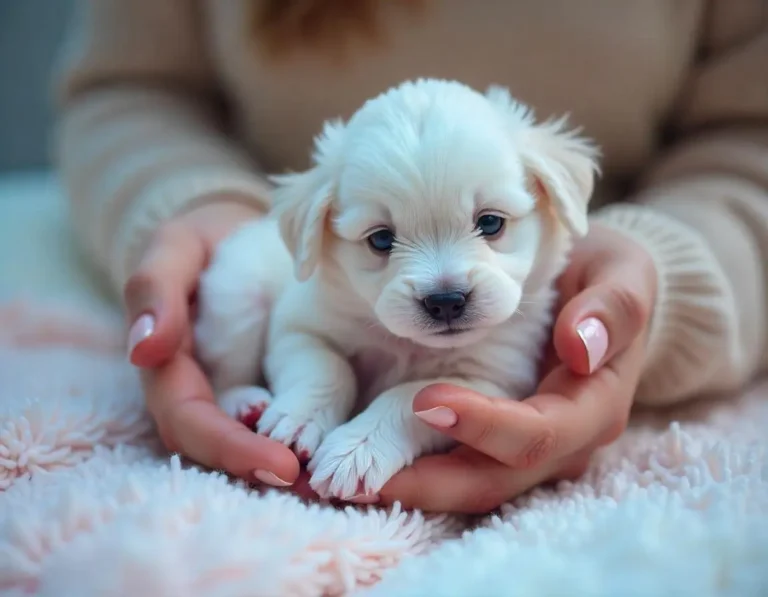
The early days of a Baby Poodle’s life are crucial for its growth and development. If you’re fortunate enough to care for a newborn poodle, it’s important to understand their needs to ensure they grow up healthy and happy. From feeding and hygiene to health check-ups and socialization, proper care is essential for a thriving puppy.
Newborn Baby Poodle Care Tips: What to Expect in the Early Stages
A Baby Poodle, like all newborn puppies, requires a lot of care in the early stages. In the first few weeks, your newborn poodle will be extremely dependent on its mother for warmth, food, and care. If the mother is unavailable, you’ll need to step in and provide appropriate care. Newborn poodles are tiny, and their immune systems are still developing, so extra attention to their needs is essential.
During this period, ensure that your newborn puppy is kept in a warm, quiet environment. Puppy-proofing the area where your Baby Poodle will spend its time is important to keep them safe. Since newborn poodles cannot regulate their body temperature efficiently, they may require supplemental heat, such as a heating pad, to stay warm.
Steps for Feeding, Socialization, and Health Check-ups
When caring for a newborn Baby Poodle, feeding is a priority. If the mother is not present, you’ll need to feed the pup with a specially formulated puppy milk replacement. A bottle or syringe can be used to provide the food. Newborn poodles should be fed every 2 to 3 hours during the first few weeks of their lives. Gradually, they will begin transitioning to solid foods around 4 weeks of age.
Socialization for a newborn Baby Poodle starts early. While they are still very young, gentle handling, positive reinforcement, and early exposure to various people and situations can help them grow up to be well-adjusted dogs. However, be cautious about overwhelming them, and make sure that any interactions are calm and positive.
Health check-ups with the vet should start as early as possible. These visits will ensure that your newborn puppy is developing correctly and is free from health concerns. Regular vet visits during the first few months are key to monitoring their growth and ensuring they are on track for vaccinations and deworming.
Newborn Poodle Development and Hygiene
During the newborn stage, your Baby Poodle will go through rapid growth. They will gradually open their eyes and ears, start to walk, and show curiosity about the world around them. It’s important to keep track of your puppy’s development and ensure that they are meeting their milestones, such as weight gain and activity levels.
Hygiene for your newborn poodle is important too. Keeping the puppy’s living area clean is crucial to avoid infections and ensure that they are comfortable. Puppies, especially newborns, can be prone to infections, so maintaining proper hygiene is essential for their health. Regular cleaning of bedding and living spaces, as well as proper care for the puppy’s coat and skin, will help keep them healthy.
Health Considerations for Newborn Poodles
Newborn poodles are vulnerable to several health issues, including parasites, dehydration, and infections. Regular visits to the vet will help detect any potential problems early on. You should also make sure that your newborn puppy is receiving the proper vaccinations and deworming treatments as recommended by your vet.
Proper nutrition is crucial to a newborn poodle’s health and development. Puppy nutrition is especially important during the first few weeks, as the right diet helps promote growth, immune function, and overall well-being. Consult your veterinarian for guidance on feeding schedules and the appropriate puppy formula.
Caring for a Baby Poodle in the newborn stage requires patience, knowledge, and attention to detail. From feeding and socializing to healthcare and hygiene, each step plays a key role in your puppy’s development. By providing the proper care during this critical time, you ensure that your newborn Baby Poodle grows into a healthy, happy dog ready for a lifetime of love and companionship.
Is Toy Poodle High Maintenance?
If you’re thinking about bringing a Baby Poodle into your home, you might wonder if Toy Poodles are high maintenance. While Toy Poodles are small, they do require attention when it comes to grooming, exercise, and behavior. Their curly, hypoallergenic coat needs regular grooming care to avoid matting, which means you’ll need to brush them frequently and visit a groomer every so often. Additionally, Toy Poodles have high energy levels and need daily exercise to stay fit and happy. Without enough mental stimulation and exercise, they can become bored or even develop undesirable behaviors. When it comes to training, Toy Poodles are highly intelligent and can quickly learn commands, but they do require consistent behavioral training and socialization from a young age. Their dietary needs should also be managed carefully, as small dogs like Toy Poodles can be prone to overeating or obesity. Although their grooming and exercise requirements might seem like a time commitment, the love and companionship they offer make it well worth it. In terms of cost of ownership, they may need regular vet visits and grooming, but their overall care is manageable with the right attention. So, while Toy Poodles may require some extra effort, they’re not overly high maintenance compared to other breeds when their needs are met consistently.
Do Poodle Puppies Bark a Lot?
Poodle puppies, including Baby Poodles, are known for being quite vocal, but how much do they actually bark? Poodles, as a breed, are generally intelligent and communicative dogs, which means they may bark to express their needs or alert you to something unusual. However, excessive barking is not typical if they are well-trained and mentally stimulated. Like any small dog, Baby Poodles might be more prone to barking when they feel anxious or excited, especially if they experience separation anxiety or are bored. Training can help curb excessive barking, especially when they are taught proper behaviors from a young age. Poodles are also known to respond well to positive reinforcement, so rewarding quiet behavior can encourage them to bark less. By providing sufficient exercise, social interaction, and mental stimulation, you can reduce barking tendencies and help your Poodle learn how to communicate in a more balanced way. With proper training, Baby Poodles can become obedient dogs that only bark when necessary, making them great companions for families and individuals alike.
Are Poodles Good House Dogs?
Poodles, including Baby Poodles, are excellent house dogs and make great companions for many types of households. Whether you have a Toy Poodle, Miniature Poodle, or a Standard Poodle, their friendly temperament and adaptability make them wonderful indoor pets. Poodles are highly intelligent and easily trainable, meaning they can quickly adjust to living in an apartment or house environment. They are also known for being hypoallergenic, which is a great bonus for families with allergies. Their playful nature and love for socializing make them ideal family pets, as they enjoy being around people and other animals. However, Poodles do have exercise needs and require regular playtime to stay happy and healthy. With proper training and socialization, they adapt well to the home environment, making them excellent house dogs for families, singles, or anyone seeking a loving, family-friendly pet.
Baby Poodle Dog Price | How Much Should You Expect to Pay?
The cost of a Baby Poodle can vary widely depending on several factors such as breed type, size, and the breeder’s reputation. On average, a purebred Baby Poodle can range in price from a few hundred to several thousand dollars. Toy Poodles typically fall on the lower end of the price range, while Miniature and Standard Poodles may cost more due to their size and specific characteristics. The price is also influenced by factors like breeder costs, health guarantees, and whether the puppy has been registered with a kennel club. Additionally, if you’re adopting a Baby Poodle from a shelter, you might encounter lower fees compared to purchasing from a breeder, but you’ll still need to factor in the cost of puppy training, grooming, and ongoing care. Be prepared to invest in the well-being of your Baby Poodle, as expenses like grooming and medical care can add up over time. When considering the price, it’s essential to think about the long-term costs of raising a puppy and ensure that you’re ready for the responsibility of a purebred dog.
Baby Poodle for Sale | Where to Find Your New Best Friend

If you’re looking for a Baby Poodle for sale in California, it’s important to find a reputable breeder or adoption center. Start by researching trusted Poodle breeders who specialize in Toy Poodles, Miniature Poodles, and other small dog breeds. Reputable breeders ensure that their Poodle puppies are healthy, well-socialized, and come with the necessary health guarantees and vaccinations. Alternatively, puppy adoption is another great option, as local shelters and dog rescue organizations often have purebred Poodles available for adoption. At Toy and Poodle Puppies, we pride ourselves on offering healthy, happy Poodle puppies for families looking for the perfect companion dog. Whether you’re interested in a Toy Poodle or Miniature Poodle, it’s essential to verify the breeder’s credentials and ensure that you’re getting a pup with a friendly temperament and solid health background. Avoid purchasing from pet stores or online classifieds where the puppy’s origin may be unclear. By working with a reputable breeder or adoption center, you can be sure you’re bringing home a well-cared-for, hypoallergenic puppy that will be a great addition to your family.
Conclusion
Raising a Baby Poodle is a rewarding experience that comes with lots of joy and companionship. From training to grooming, Baby Poodles are known for their intelligence, playfulness, and affectionate nature, making them a great choice for families. Remember that proper socialization and regular exercise are key to raising a well-behaved and happy pup. Grooming, although important, is manageable with consistent care, ensuring your Poodle’s coat remains healthy and shiny. Whether you’re considering adopting or purchasing a Poodle, it’s important to choose a reputable breeder or adoption center to ensure you bring home a healthy and well-adjusted pup.
If you’re ready to welcome a Baby Poodle into your home, explore the adorable Poodle puppies we have available for sale at Toy and Poodle Puppies. We’d love to hear about your experiences and help guide you in your decision-making process. Share your thoughts or contact us today to find your new furry friend.
FAQs
Is a Toy Poodle High Maintenance?
Yes, Toy Poodles can be considered high maintenance due to their need for regular grooming. Their curly coat requires frequent brushing to prevent matting, and they benefit from consistent training to avoid behavioral issues. However, with the right care routine, they make wonderful companions with manageable maintenance needs.
Do Poodle Puppies Bark a Lot?
Poodle puppies, including Baby Poodles, can be vocal, but the amount they bark largely depends on their training and environment. Without proper guidance, they may develop excessive barking habits. Early socialization and obedience training can help reduce unnecessary barking, making them more well-behaved in various settings.
Are Poodles Good House Dogs?
Yes, Poodles are excellent house dogs. They are highly adaptable and can thrive in apartments or houses with proper exercise and mental stimulation. Poodles enjoy being indoors with their family and are usually calm and affectionate, but they still require daily walks and playtime to stay happy and healthy.
How Much Does a Baby Poodle Cost?
The cost of a Baby Poodle typically ranges from $1,200 to $3,000, depending on factors like the breeder’s reputation, the dog’s lineage, and the color or size of the puppy. Make sure to choose a responsible breeder who provides health guarantees and follows ethical breeding practices to ensure you get a healthy puppy.
Do Baby Poodles Need a Lot of Grooming?
Yes, Baby Poodles, especially Toy and Miniature Poodles, require regular grooming. Their curly coats tend to mat easily if not brushed frequently. Regular brushing, along with professional grooming every 6-8 weeks, will help maintain their hypoallergenic coat and prevent skin irritations.
How Can I Tell If My Baby Poodle is a Toy or Miniature Poodle?
The key difference between Toy and Miniature Poodles is their size. Toy Poodles are typically no more than 10 inches tall and weigh between 4-6 pounds, while Miniature Poodles range from 10-15 inches in height and weigh between 10-15 pounds. Knowing their size will help you provide the right care for your puppy.
